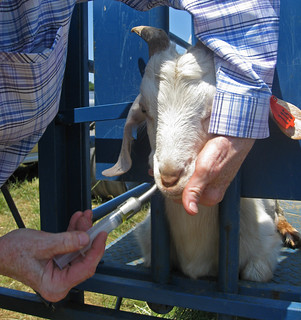Upon arrival, all goats will be sequentially dewormed with albendazole (Valbazen©), moxidectin (Cydectin©), and levamisole (Prohibit©). They will be orally dosed based on weight. Dosages will be those recommended by the American Consortium for Small Ruminant Parasite Control (see dewormer chart for goats).
The purpose of the initial sequential dosing is to make sure all the goats start the test equally and "free" from parasites. This way, the differences observed in the test can be attributed to genetics and not environment.
There is no benefit to deworming a goat prior to the test, unless it becomes clinically parasitized. Deworming prevents a goat from developing immunity. All goats eventually developed immunity to parasites, though immunity can always be overcome by stress and a heavy parasite challenge. To develop immunity, goats need continuous exposure to parasites.
The first 13 days of the test will serve as an adjustment period. Initial data will be collected on July 9. The data collected on June 26 will not count towards the test results, as it is the result of past management. Fecal samples collected on June 26 and July 9 will be compared to determine the efficacy of the sequential deworming. In the past, the sequential deworming has reduced fecal egg counts by more than 95 percent.
All additional dewormings will be based on need, according to FAMACHA© scores, the Five Point Check©, and other criteria (e.g. weight gain/loss). Read deworming protocol.
Parasite resistance (fecal egg counts) and parasite resilience (FAMACHA© scores and treatment need) are two of the primary criteria that will be used to identify the 10 top-performing bucks.
The purpose of the initial sequential dosing is to make sure all the goats start the test equally and "free" from parasites. This way, the differences observed in the test can be attributed to genetics and not environment.
There is no benefit to deworming a goat prior to the test, unless it becomes clinically parasitized. Deworming prevents a goat from developing immunity. All goats eventually developed immunity to parasites, though immunity can always be overcome by stress and a heavy parasite challenge. To develop immunity, goats need continuous exposure to parasites.
The first 13 days of the test will serve as an adjustment period. Initial data will be collected on July 9. The data collected on June 26 will not count towards the test results, as it is the result of past management. Fecal samples collected on June 26 and July 9 will be compared to determine the efficacy of the sequential deworming. In the past, the sequential deworming has reduced fecal egg counts by more than 95 percent.
All additional dewormings will be based on need, according to FAMACHA© scores, the Five Point Check©, and other criteria (e.g. weight gain/loss). Read deworming protocol.
Parasite resistance (fecal egg counts) and parasite resilience (FAMACHA© scores and treatment need) are two of the primary criteria that will be used to identify the 10 top-performing bucks.












